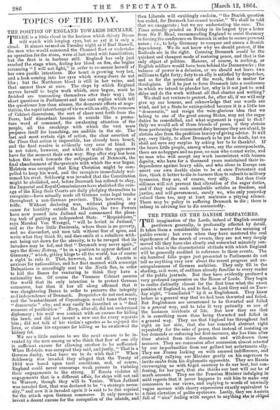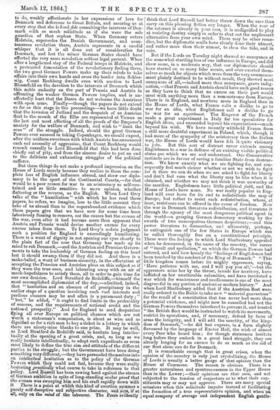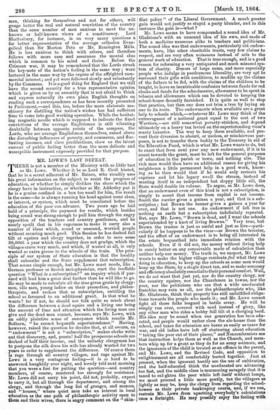THE PEERS ON THE DANISH DESPATCHES.
THE imagination of the Lords, indeed of English country gentlemen generally, is profoundly affected by detail. It takes them a considerable time to master the meaning of public events ; but even when they have mastered the real significance of the march of events, they are not very deeply moved till they have also clearly and somewhat minutely con- ceived what is the characteristic attitude with which England will be generally credited in reference to those events. The six hundred folio pages just presented to Parliament do not tell us anything very new about the recent progress and un- scrupulousness of German ambition. They only fill in the shading, as it were, of outlines already familiar to every reader of the public journals. But they have evidently produced a very profound impression on the House of Lords. They begin to realize distinctly almost for the first time what the exact position of England is, and to feel, as Lord Grey said on Tues- day night, " humiliated " by it as Englishmen. They knew before in a general way that we had been thwarted and foiled. But Englishmen are accustomed to be thwarted and foiled in a general way, and to take it very patiently as one of the business incidents of life. But now they see that it is something more than balg thwarted and foiled in a general way. They see that England has throughout had right on her side, that she has conceded abstract right repeatedly for the sake of peace, that instead of insistinc,° on her demands or enforcing her first menaces, she has time after time abated from those demands and withdrawn those menaces. They see concession after concession almost extorted by our importunities from our gallant but unfortunate ally. They see France looking on with amused indifference, and constantly rallying our Minister gently on his eagerness to invite snubs from his diplomatic opponents. They see Russia encouraging us with frigid courtesy to do our best, but con- fessing, for her part, that she thinks our best will not be of much account. They see the Prussian Minister indulging in mild regrets that it never happens to suit him to make any concession to our views, and replying to words of unwisely vague menace with cheery expressions exactly equivalent to a faint elevation of polite eyebrows. Lastly, they see Austria full of "nice" feeling with respect to anything she is obliged to do, weakly affectionate in her expressions of love for Denmark and deference to Great Britain, and assuring us at every step that she is bond fide consulting the interests of Den- mark with as much solicitude as if she were the sole guardian of that orphan State. When Germany enters Holstein, supersedes the Danish Government, and coun- tenances revolution there, Austria represents in a candid whisper that it is all done out of consideration for Denmark, and lest the minor German States should have effected the very same revolution without legal pretext. When after a lengthened stay of the Federal troops in Holstein, and a protracted fomentation of the revolutionary feeling there, the two great German Powers make up their minds to take affairs into their own hands and cross the border into. Schles- viig, Count Rechberg dwells even with unction to Lord Bloomfield on the devotion to the interests of Denmark which this noble audacity on the part of Prussia and Austria in affronting the weaker German Powers implies, and is un- affectedly hurt that the Danes do not welcome the Austrians with open arms. Finally—though the papers do not extend so far as this stage in the proceedings—we have little doubt that the invasion of Jutland and the despatch of an Austrian fleet to the mouth of the Elbe are represented at Vienna as the last and most affecting of all the proofs of the Emperor's anxiety for the welfare of Denmark, and wish to " limit the area " of the struggle. Indeed, should the great German Powers ever succeed in taking Copenhagen, we should expect, after the uniform sweetness with which Austria has announced each sad necessity of aggression, that Count Rechberg would remark casually to Lord Bloomfield that this had been done chiefly out of pity, and from the sincere desire to put an end to the delirious and exhausting struggles of the political sufferer.
But these things do not make a profound impression on the House of Lords merely because they realize to them the com- plete loss of English influence abroad, and show our diplo- macy to be the sport of the Continental Courts,—for that would be a poor reason for war to an aristocracy so self-con- tained and so little sensitive to mere opinion, whether flattering or the reverse, as the English. When Lord Grey talks of the " humiliation " with which he has read these papers, he refers, we imagine, less to the little account they take of us abroad than to the superabundant evidence which these papera give that we have now for some time been laboriously fussing to remove, not the causes but the excuses of the war, even after it had become more than apparent that Austria and Prussia' would devise another excuse for every excuse taken from them. To Lord Grey's sedate judgment such a position for England is exceedingly humiliating. There is a want of dignity in not opening our eyes clearly to the plain fact of the case that Germany has made up its mind to rob Denmark,—and the Austrian and Prussian Govern- ments to take the leadership of German feeling on this head lest it should swamp them if they did not. And there is a make-belief, a want of business sincerity, in the affectation of accepting the Prussian and Austrian pleas on this subject as if they were the true ones, and labouring away with an air of mock-hopefulness to satisfy them, all in order to gain time for our own decision. Lord Stratford de Redcliffe,—himself the most accomplished diplomatist of the day,—admitted, indeed, that " hesitation and an absence of all precipitancy in the earlier stage of a question involving such vast interests and perilous chances may be and often is a paramount duty ; " but," he added, " it ought to find limits in the probability of success, and the requirements of national credit and the national prosperity." And for England to send despatches flying all over Europe on political chances which are not worth a statesman's computation, is about as wise and as dignified as for a rich man to buy a ticket in a lottery in which there are ninety-nine blanks to one prize. It may be well, as Lord Stratford de Redeliffe said, to hesitate long intellec- tually at the opening of a great crisis, and, so long as we really hesitate intellectually, to adopt such expedients as seem most likely to define the true aim and attitude of the different parties to the struggle; but the Government have been doing something very different,—they have persuaded themselves into an intellectual hesitation as to the policy of the German Powers which they could not feel, because they were really hesitating practically what course, to take in reference to that policy. Lord Russell has been rowing hard against the stream of German ambition in spite of long-standing ocular proof that the stream was sweeping him and his craft rapidly down with it There is a point at which this kind of exertion assumes a purely self-deceptive and subjective character, and 'acts, if at all, only on the mind of the labourer. The Peers evidently think that Lord Russell had better throw down the oars than carry on this pleasing fiction any longer. When the roar of the cataract is already in your ears, it is undignified to play at resisting destiny simply in order to shut out the unpleasant alternative from your own mind. There may be other reme- dies, but the diplomatic sculls have clearly done their utmost, and rather more than their utmost, to stem the tide, and in vain.
But if the Lords on Tuesday night showed no annoyance at the somewhat startlingloss of our influence in Europe, and did show some, in a moderate way, that our diplomatists should have started on so many false scents, and over-exerted them- selves so much for objects which were from the very commence- ment plainly destined to be without result, they showed most annoyance of all,—indeed more than annoyance, grave indig- nation, —that Prussia and Austria should have such good reason as they have to think that no excess on their part would meet with anything more than a remonstrance from Europe. There is in England, and nowhere more in England than in the House of Lords, what France calls a dislike to go to war for an idea, what Englishmen call a dislike to go to vier for an experiment. The Emperor of the French made a great experiment in Italy far too speculative for English ideas, and succeeded beyond his expectations—much beyond his wish. We have recently withheld France from a still more doubtful experiment in Poland, which, though it had more of the sympathy of the aristocracy than the Italian war, the House of Lords would have felt it quite visionary to join. But this sort of distrust never extends among Englishmen to a war in defence of an existing visible political status quo which we see and understand. Our Conservative instincts are in favour of saving a familiar State from destruc- tion. We know exactly what we arc fighting for, and con- sequently feel much clearer whether or not we wish to fight for it than we can do when we are asked to fight for liberty and don't feel sure what the liberty may be like when it is obtained, and whether we may not think it was unworthy of the sacrifice. Englishmen have little political faith, and the House of Lords have none. No war really popular in Eng- land will ever have for its end to redistribute the map of Europe, but rather to resist such redistribution, where, at least, resistance can be offered in the cause of freedom. Now the war in Denmark threatens redistribution, and threatens it through the agency of the most dangerous political agent in the world—a grasping German democracy working by the swords of two unscrupulous German despotisms ;—aud this power threatens to dismember, awl ultimately, perhaps, to extinguish one of the few States in Europe which can be called thoroughly free on a constitutional principle. These were the feelings to which Lord Shaftesbury appealed when he denounced, in the name of the country, the career of "insult and spoliation," on which the German Powers had entered, and said how keenly the "feelings of Englishmen had been touched by the conduct of the King of Denmark." " This little kingdom comes before its mighty oppressors, saying, Have patience with me, and I will pay you all,'—but the oppressors seize her by the throat, invade her territory, have inflicted on her unutterable calamities, and have instituted a war which for wantonness and needlessness is one of the most disgraceful in any portion of ancient or modern history." And when Lord Shaftesbury added that if the Austrian fleet were really ordered to the Baltic to take new " material guarantees" for the recall of a constitution that has never had more than a potential existence, and might now be cancelled had not the German Powers themselves interfered to prevent it, and trusted " the British fleet would be instructed to watch its movements, restrict its operations, and, if necessary, defend by force of arms the integrity, and I will add the sanctity, of the king- dom of Denmark,"—he did but express, in a form slightly flavoured by the language of Exeter Hall, the wish of almost every Peer who heard him ; for though statesmen hesitate long before they embark in a great land struggle, they are already longing for an excuse to do as much as the aid of our fleet alone can do for Denmark.
It is remarkable enough that in great crises, when the opinion of the country is only just crystallizing, the House of Lords is usually a better gauge of that opinion than the House of Commons. The reason is obvious. There is a greater naturalness and spontaneousness in the Upper House than in the Lower ;—their opinions are their own, and not subjected to the tension of conjecture as to what their con- stituents may or may not approve.There are many spec's' occasions when this solicitude impairs instead of facilitating the formation of a true representative opinion, and when an equal company of average and independent English gentle- men, thinking for themselves and not for others, will gauge better the real and natural conviction of the country than the same number of men anxious to meet the un- known or half-known views of a constituency. Lord Shaftesbury, for instance, is on very many questions a far better representative of the average orthodox Evan- gelical than Sir Morton Peto or Mr. Remington Mills. He is less anxious to think with others, and therefore follows with more ease and assurance the mental clue which is common to his mind and theirs. Before the Crimean war, it may be remembered that the Lords struck the key-note of the nation's feeling in the same way ; were lectured in the same way by the organs of the affrighted com- mercial interest; and yet were followed slowly and reluctantly by the Commons. It is a good thing for England that we still have the second security for a true representative opinion which is given us by an assembly that is not afraid to think and express naturally its own plain English thoughts on reading such a correspondence as has been recently presented to Parliament,—and this, too, before the more elaborate ma- chinery for distilling the nation's wishes has had sufficient time to come into good working operation. While the hesitat- ing magnetic needle which is supposed to indicate the fixed convictions of the average Englishman is still vibrating doubtfully between opposite points of the compass, the Lords, who are average Englishmen themselves, raised above the disturbing influences of poverty, and commerce, and fluc- tuating incomes, and class predilections, show us the latent current of public feeling better than the more delicate and susceptible instrument expressly provided for that purpose.




































 Previous page
Previous page